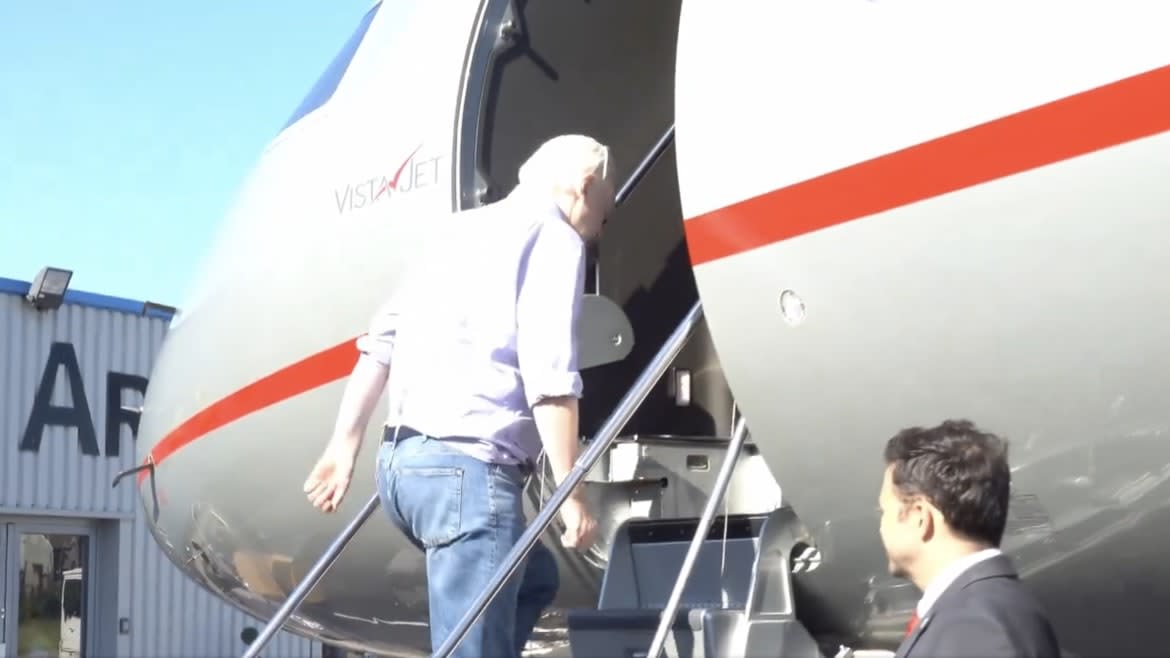Julian Assange Leaves Prison After Striking U.S. Plea Deal

Julian Assange is officially breathing free air.
In a statement on its official X account, WikiLeaks said its founder had been released from the British prison where he’d been incarcerated for the last five years—the result of a plea bargain he struck Monday with American prosecutors.
The deal will see him avoid extradition back to the U.S., as well as further prison time—leaving him free to return to his native Australia and bringing to an end his years-long legal odyssey.
Assange, the founder of WikiLeaks, will plead guilty to a single felony count of conspiring to illegally obtain and disseminate classified information related to U.S. national defense, according to newly filed federal court records.
Federal prosecutors recommended a 62-month prison sentence, the length of time Assange has languished in a London prison while fighting tooth and nail not to be returned to the U.S. He is set to be credited with time served and set free, although the deal had yet to be given the final stamp of approval by a federal judge on Monday night.
Assange will plead guilty and be sentenced in a single hearing on Tuesday evening, according to a letter from his lawyers filed alongside charging documents. The hearing is set to take place in a U.S. federal court in the Mariana Islands, a U.S. commonwealth in the western Pacific Ocean.
After being granted bail by a London court Monday, he boarded a plane and departed the U.K. around 5 p.m. local time, the organization said, sharing footage of the white-haired Assange crossing the tarmac and climbing up the stairs of a small plane.
“JULIAN ASSANGE IS FREE,” it trumpeted in its statement.
JULIAN ASSANGE IS FREE
Julian Assange is free. He left Belmarsh maximum security prison on the morning of 24 June, after having spent 1901 days there. He was granted bail by the High Court in London and was released at Stansted airport during the afternoon, where he boarded a…— WikiLeaks (@wikileaks) June 24, 2024
After starting WikiLeaks nearly two decades ago, Assange ran afoul of the Justice Department in 2010 when he published a cache of classified military and diplomatic documents, including hundreds of thousands of pages related to the wars in Afghanistan and Iraq.
He fled Sweden that year after local authorities separately issued him an arrest warrant for questioning in a sexual assault investigation. Landing in London, he holed up inside Ecuador’s embassy there, where he would remain for the next seven years, reportedly fathering two children in that time.
In 2019, the Ecuadorian government revoked the asylum it had granted Assange after U.S. prosecutors began seeking to extradite him on espionage and computer misuse charges. Indicted by a federal grand jury in Virginia, Assange was accused of working with Chelsea Manning, a former U.S. Army intelligence analyst, to spread state secrets via WikiLeaks.
British police, who’d kept constant watch outside, quickly entered the embassy and grabbed Assange, throwing him in Belmarsh Prison on the city’s outskirts while he appealed his extradition. (Manning was convicted of espionage in connection with the WikiLeaks dump. Her 35-year prison sentence was commuted in 2017 by then-President Barack Obama.)
WikiLeaks said in its statement that Assange had spent 1901 days in Belmarsh, confined to “a 2x3 metre cell, isolated 23 hours a day.” It said that Monday’s plea deal was “the result of a global campaign that spanned grass-roots organisers, press freedom campaigners, legislators and leaders from across the political spectrum, all the way to the United Nations.”
The organization promised more details would be forthcoming. “As he returns to Australia, we thank all who stood by us, fought for us, and remained utterly committed in the fight for his freedom,” it said. “Julian's freedom is our freedom.”
Had he been convicted of the 18 charges he faced in the federal indictment, Assange could have been sentenced to a maximum of 175 years behind bars.
Get the Daily Beast's biggest scoops and scandals delivered right to your inbox. Sign up now.
Stay informed and gain unlimited access to the Daily Beast's unmatched reporting. Subscribe now.

 Yahoo News
Yahoo News 
